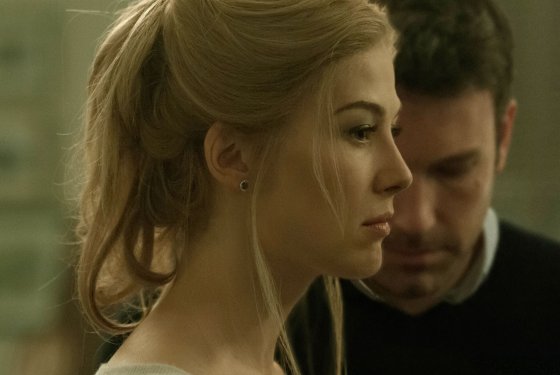If for some reason you have found yourself here and you haven’t read or seen Gone Girl, go away. Seriously. You will only ruin the experience, there are too many spoilers here. Thank you, come again.
David Fincher and Gillian Flynn’s sprawling modern American thriller, Gone Girl, has already cemented its place as one of the best films of the year. It is surely impossible to sit through the 149 minutes of Gone Girl and not be engrossed and entertained by the twisting film. The film and book have both garnered rave reviews for being a strong critique/parody of marriage, but the film is not about marriage. Gone Girl is about the continuously overpowering monster on our backs; the media.
While the first half of the film plays out like an above-average thriller – alternating timelines between Nick Dunne’s (Ben Affleck) search for his wife Amy (Rosamund Pike), and her detailed diary of their burgeoning love – the second half takes a remarkably different tact. This is obvious in the basic twist (seriously, stop reading this if you don’t want to see irreparable spoilers) that Amy was behind her own disappearance. The movie shifts dramatically and the audience’s growing hatred for Nick flies out the window just like a fluffy-ended pink pen. The attention of the films theme turns completely from marriage and love, to the swirling media circus Nick has to deal with.
Fincher sets the media in a conflicting light. It seems all powerful – even Nick’s sister, Margo is influenced by Missy Pyle’s excellent TV host Ellen Abbot – yet cant help the country find its most wanted face. Amy planned on killing herself to send Nick to the electric chair before even she fell for the spell of current affairs television. The satirical statement of Amy being a beautiful, rich, white, pregnant female in a loving marriage, living in America’s heartland drawing such attention is spot on. Yet only one person semi-recognises Amy, and it isn’t for being Amy. Even had the audience not been privy to Amy’s average ‘transformation’, we would have known it was her on that casino boat. Heck, Barney Stinson recognised her straight away.
When star lawyer Tanner Bolt (played with straight-faced excellence by Tyler Perry) shows up to rescue Nick, the movie becomes a full blown media relations mission. Nick’s hiding from the media, sudden determination on Sharon Schieber’s (Sela Ward) television program to win over the public and Amy, and Amy’s media plan when she returns showcase the importance of public perception to a couple of unknown former journalists. Nick doesn’t dare leave when he should because he is convinced the public backlash would be too much.
As always the media leaves quicker than expected but by then Nick can’t run from the oncoming baby, and perhaps he has built up too much begrudging respect for Amy and the process to want out. Through the surprisingly hilarious back half of the film, the story is not about marriage. It’s less about misogyny too. There is no denying it is still all about the Benis, but above all Fincher positions this as a cautionary tale about the power of the media in modern life. There is no escape from opinion and speculation in 21st century life, as Nick finds out and Fincher reminds us constantly.
Fincher has never focused on marriage anyway. He has been too busy with homoerotic man-children (Fight Club, The Social Network), erratic people who can’t comfortably fit in the basic confines of marriage (Zodiac, The Girl with the Dragon Tattoo), or people who are aging backwards (The Curious Case of Benjamin Button, Madonna music videos). Heck, probably his previously most fleshed out relationship ended up boxed in anyway. Fincher is more concerned about periphery problems like the traps of consumerism (Fight Club again – tangent: was Desi Collings (NPH) doomed because he was basically living in the consumer paradise that Tyler Durdan blew up?) and how to make Justin Timberlake even cooler.
Gone Girl probably doesn’t require the kind of in-depth analysis these kind of article pretend to deliver, it is amongst Fincher’s most basic films. The film knows it has twists coming, it shows the audience and it is happy to display those twists prominently, because like the media, Nick Dunne deals in the aftermath of what has just happened without foresight for what is ahead.

I absolutely loved this film. It was a really good adaptation of Flynn’s book and didn’t disappoint me at all. I was completely captivated by Rosamund Pike’s performance as Amy Dunne. She was ABSOLUTELY INCREDIBLE
http://rachelwilliams94.wordpress.com/
i agree, Pike absolutely nailed it. Right up there with my favourite films of this year for sure.
Pingback: Film Review – Gone Girl | Couch Opinions